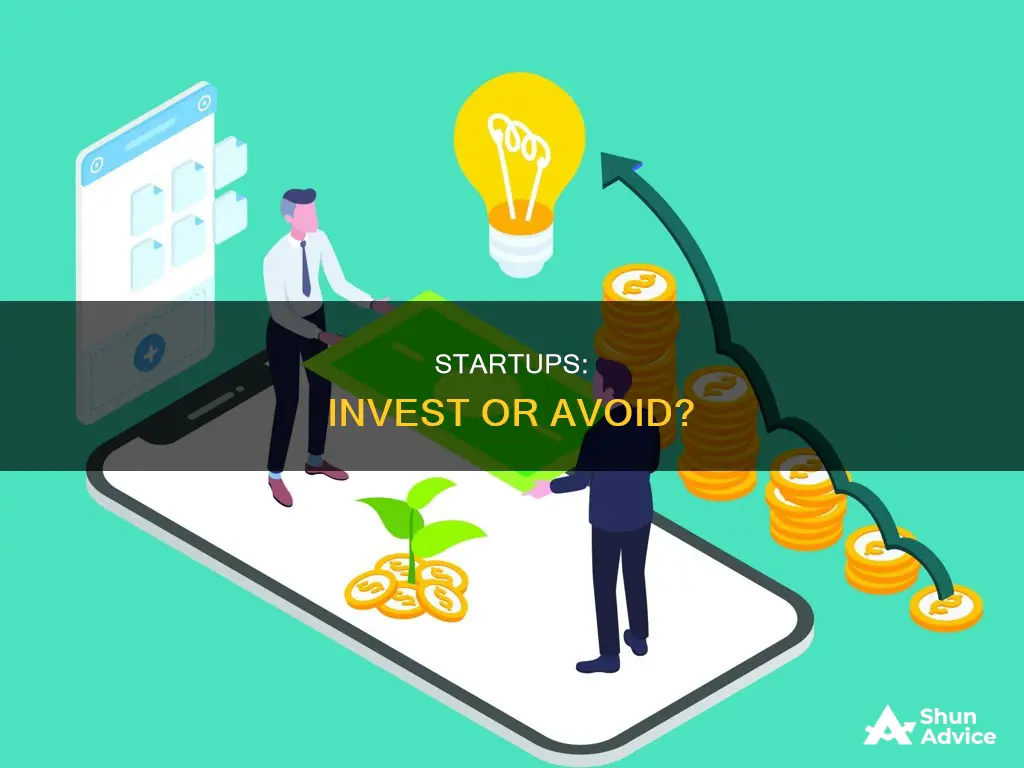
Investing in startups is a risky business. While it can be lucrative, the majority of startups fail, and investors can easily end up with nothing to show for their investment. However, for those that do succeed, the returns can be in the thousands of percent, making early investors very wealthy.
So, should people invest in startups? Well, it depends on their circumstances. If someone is struggling financially or looking for a low-risk investment, then probably not. But if they have money to spare and are passionate about a particular project or idea, then it might be worth considering.
| Characteristics | Values |
|---|---|
| Risk | High |
| Returns | High |
| Liquidity | Low |
| Diversification | High |
| Investor Type | Angel, Venture Capitalist, Friends & Family, Crowdfunding |
| Investor Profile | Passionate, Entrepreneurial, Supportive, Active |
| Investor Due Diligence | High |
| Investor Tax Benefits | Yes |
| Investor Returns | Debt, Convertible Note, Stock, Dividends |
What You'll Learn

High-Risk, High-Reward
Investing in startups is a risky business. The majority of new companies, products, and ideas simply do not make it, so there is a real possibility of losing your entire investment. However, the potential for high returns is also significant. This section will explore the "high-risk, high-reward" nature of startup investments in more detail.
High-Risk
Startups are generally founded by a small group of people with an idea they want to turn into reality. They often start as very small operations and then seek funding from venture capitalists and angel investors. The failure rate of startups is high, with estimates ranging from 80% to 90%. This means that most startups do not make it to the initial public offering (IPO) stage, and investors can lose their entire investment.
Startups are also illiquid investments. Unlike stocks, it is difficult to sell startup shares before an IPO. Investors should expect their money to be tied up for at least three to five years, if not more. There is also a timing risk associated with startups. Even if a startup succeeds, it may take years for investors to see a return on their investment.
High-Reward
Despite the high risks, startup investing offers the potential for very high returns. For those companies that do go public or are acquired, the returns can be in the thousands of percent, making early investors extremely wealthy.
Investing in startups also provides an opportunity to get in on the ground floor of a business with exponential growth potential. Large-cap stocks in established indices like the S&P 500 are far less risky, but their growth potential is limited compared to startups.
Additionally, startup investing allows investors to support innovative solutions to challenging problems and new technologies. It also provides an opportunity to invest in companies that align with an investor's personal values or interests.
In summary, investing in startups is a high-risk, high-reward proposition. While the failure rate is high, the potential returns for successful startups are also significant. Investors should carefully consider their risk tolerance and conduct thorough due diligence before investing in startups.
Investing During Depressions: Strategies for Success
You may want to see also

Diversification
The more you spread your investments, the more likely you are to invest in a successful company, which can offset the losses on companies in your portfolio that fail. While there is no guarantee that diversifying your startup investments will lead to profits, it is generally believed that it will result in better returns compared to not diversifying.
For example, let's say you invest half of your capital in an ice cream company and the other half in an umbrella company. During the summer, the ice cream company will be successful and profitable, while the umbrella company won't do well due to the weather. In the winter, the opposite will be true, and the umbrella company will be profitable. In this way, by diversifying your investments, you can reduce the overall risk of your portfolio.
Additionally, diversification can also be applied to the types of investments you make within a company. For instance, you can invest in debt, convertible notes, stock, or dividends.
It's important to note that diversification does not mean investing in every deal that comes your way. Instead, it's about ensuring your portfolio includes a wide variety of investments. By diversifying your investments, you can increase your chances of investing in a successful startup and achieving better returns overall.
Wealthy Secrets: Where the Rich Invest
You may want to see also

Impact Investment
Investing in startups is a risky business. The majority of new companies will not succeed, and investors may lose their entire investment. However, those that do succeed can produce very high returns.
Impact investing is a form of investment that seeks to generate positive, measurable social and/or environmental impacts, alongside a financial return. Impact investments can be made in both emerging and developed markets, and target a range of returns, from below market to market rate. The impact investing market provides capital to address pressing global challenges, such as sustainable agriculture, renewable energy, conservation, microfinance, and affordable basic services.
The intention to create a positive social and/or environmental impact is essential to impact investing. Impact investments are expected to generate a financial return on capital or, at the very least, a return of capital. A hallmark of impact investing is the commitment of the investor to measure and report the social and/or environmental performance and progress of underlying investments, ensuring transparency and accountability.
Impact investing challenges the view that social and/or environmental issues should be addressed solely by philanthropic donations. The impact investing market offers opportunities for investors to advance social and/or environmental solutions while also producing financial returns.
Impact investing provides a way for investors to align their beliefs and values with their capital allocation, addressing social and/or environmental issues. It is a way to support new entrepreneurs and help companies that are working towards positive social and environmental change.
While impact investing carries risks, as with any investment, it offers the potential for financial returns alongside positive societal impacts.
Amer Sports: Who Invests?
You may want to see also

High Potential for Buy-Outs
Startup investments are a risky business, with a high chance of failure. However, they also offer the potential for very high returns. One rule of thumb states that for every 10 startups, 3 or 4 fail, 3 or 4 return their original investment, and 1 or 2 succeed. The successful ones can produce very high returns, making early investors extremely wealthy.
A startup's journey typically goes through several stages, and each stage offers distinct opportunities and risks for investors. Startups often begin with funding from founders, friends, and family. As the idea develops, they may seek venture capital funding, where investors get a stake in the company in return for their investment.
Venture capitalists usually demand an active role in the company and may take on advisory positions or sit on the board of directors. Additional rounds of venture capital may be sought as the company continues to burn cash to achieve exponential growth.
The ideal exit strategy for investors is for the startup to go public through an initial public offering (IPO), which can generate significant returns. However, other exit strategies include buy-outs or takeovers of the startup by another company, which also present lucrative opportunities for investors.
Investing in startups early on, before they go public, can be extremely advantageous. In the 1980s and 1990s, most value creation happened for investors in the public market who bought stock in tech giants like Amazon and Microsoft after their IPOs. Today, however, most of the value creation has shifted to early-stage private company investors.
By investing in startups before they go public, investors can get in on the ground floor of something exciting and potentially very profitable. This is because startups are increasingly choosing to delay IPOs or stay private indefinitely, allowing early investors to reap the benefits of the company's growth.
Staying private has several advantages for startups. They can avoid activist public market investors and the pressure of delivering short-term gains, instead focusing on long-term success. Additionally, going public incurs significant accounting expenses and fees, which startups can avoid by remaining private.
For investors, the potential for a startup buy-out or takeover by another company presents an opportunity to exit their investment with substantial returns. While an IPO is the ideal scenario for many, a buy-out can also result in a large pay-off, especially if the acquiring company is well-established and financially strong.
In summary, investing in startups carries a high level of risk, but it also offers the potential for high rewards. The possibility of a buy-out or takeover adds another layer of opportunity for investors, providing an alternative exit strategy to the traditional IPO route. As always, thorough research and due diligence are crucial before investing in any startup to mitigate potential losses.
Nike: A Smart Investment Choice?
You may want to see also

Early Investment Means Greater Rewards
Investing in startups is a risky business. The majority of new companies, products, and ideas simply do not make it, so there is a real possibility of losing your entire investment. However, the high risk is coupled with the potential for very high returns. Early investors can become very wealthy if the startup succeeds.
Lower Barriers to Entry for Early-Stage Investors
With the advent of crowdfunding, it is now easier to become an early-stage investor. The lower overhead capital requirement, plus the potential for high rewards, is enticing for investors.
Diversification
Startup investments are substantially different from traditional assets, bonds, and stocks. They are also less prone to market fluctuations. Therefore, investing in startups can help to mitigate financial risks by diversifying your portfolio.
High Potential for Buy-Outs
Large companies often buy out startups that have the potential to be future competitors or that have developed new technologies that can further their business. If the startup you invested in is bought out at a high price, you will enjoy high returns on your investment.
Impact Investment
When you invest in a startup, you are not only helping to create jobs but also powering innovations. For investors who want to directly impact and support job creation in their community, investing in startups is a great path.
Salomon Ski Investors: Who's Behind the Brand?
You may want to see also
Frequently asked questions
Yes, investing in startups is a risky business. The majority of new companies, products, and ideas simply do not make it, so there is a real possibility of losing your entire investment. However, the ones that do succeed can produce very high returns on investment.
There are a few ways to invest in startups. One way is through investment platforms or crowdfunding sites, which offer curated selections of companies and have varying minimum buy-ins. Another way is to become an angel investor, which typically involves providing the first check to startups looking to prove their ideas. A third option is to invest in a friend's startup or one with a personal connection.
Investing in startups offers the potential for high rewards. Early investment can lead to greater rewards, as getting in on the ground floor means the potential for higher returns if the startup succeeds. Investing in startups also allows for portfolio diversification, as it is substantially different from traditional assets, bonds, and stocks. Additionally, startups are less prone to market fluctuations and are often in emerging markets or industries, such as technology, medicine, and agriculture.
The biggest risk of investing in startups is the high failure rate, with 90% of startups estimated to fail. There is also a lack of liquidity, as it is difficult to sell equity in a startup or private company. It can take a long time to see results, even if a startup succeeds, and there may be restrictions on selling stock before an IPO.







